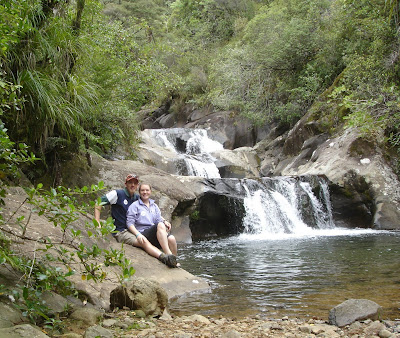 Our first morning had us waking up in Thames. It was a quaint little town with phenomenal antique stores. I saw 200 year old furniture in pristine original condition selling for as little as $300 to $500 USD. The same style, age and type of furniture in the states sells for thousands of dollars. Note to self...figure out how much it costs to ship that stuff to the states...
Our first morning had us waking up in Thames. It was a quaint little town with phenomenal antique stores. I saw 200 year old furniture in pristine original condition selling for as little as $300 to $500 USD. The same style, age and type of furniture in the states sells for thousands of dollars. Note to self...figure out how much it costs to ship that stuff to the states...Other note to self....when I can afford it...
 Thames War Memorial. Honoring the soldiers of WWI, WWII, and various other conflicts that the Kiwi's participated in.
Thames War Memorial. Honoring the soldiers of WWI, WWII, and various other conflicts that the Kiwi's participated in. A closer look at Thames, complete with a classical style church.
A closer look at Thames, complete with a classical style church. More narrow roads from the wrong side of the car.
More narrow roads from the wrong side of the car. Something pink. The shape was intriguing.
Something pink. The shape was intriguing. We took a lunch break and toured a garden in Tapu at the Rapaura Water Gardens. The Coromandel Peninsula is known for its artsy communities and eccentric life styles. I took a couple of dozen photographs of interesting water features, flower arrays and sculptures. These are just a couple that caught my eye.
We took a lunch break and toured a garden in Tapu at the Rapaura Water Gardens. The Coromandel Peninsula is known for its artsy communities and eccentric life styles. I took a couple of dozen photographs of interesting water features, flower arrays and sculptures. These are just a couple that caught my eye.

 Chess anyone? The king stood about four feet tall. They are carved out of the trunk fern trees.
Chess anyone? The king stood about four feet tall. They are carved out of the trunk fern trees. Interesting contrast
Interesting contrast Rapaura Waterfalls. It was a short walk to these private waterfalls. I wonder what they look like when it rains?
Rapaura Waterfalls. It was a short walk to these private waterfalls. I wonder what they look like when it rains?


 Its amazing, the variety of terrain and vegetation. True, the jungle has been carved back for generations. From pastures and fields like this comes the lifeblood of the country. Sheep. Though now I suspect tourism plays a larger role in supporting the economy. How would you like to be the farmer that wakes up every morning on that bay?
Its amazing, the variety of terrain and vegetation. True, the jungle has been carved back for generations. From pastures and fields like this comes the lifeblood of the country. Sheep. Though now I suspect tourism plays a larger role in supporting the economy. How would you like to be the farmer that wakes up every morning on that bay?




No comments:
Post a Comment